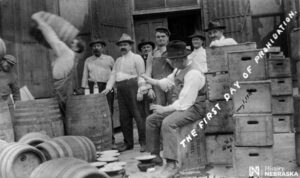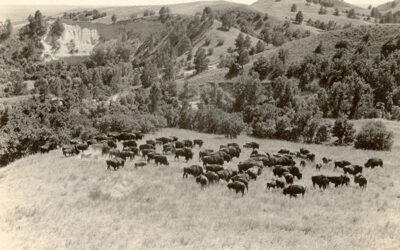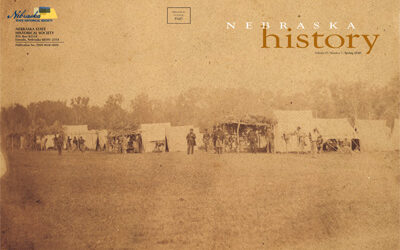The passage of the Eighteenth Amendment to the U.S. Constitution outlawed the manufacture and sale of liquor nationwide, but statewide prohibition was already in effect in Iowa and Nebraska. In 1916 Iowa went dry and Nebraska voters adopted a prohibitory amendment to their state constitution that took effect in May 1917. Enterprising individuals soon learned how to profit by flouting the law. The Dakota County Herald on May 24, 1917, reprinted an article from the Sioux City (Iowa) Journal reporting the bootlegging then rampant in that vicinity: “When Iowa went dry January 1, 1916, bootlegging increased in Sioux City. For the first few months everybody who had a taste for this profitable business indulged himself. But when the police raiding squad started its work the ranks soon were thinned. The man with the clever idea survived, and his unimaginative neighbor was run out of business. “It is the work of the members of the raiding squad to solve the question of where the liquor is hidden each time a raid is made on a ‘joint.’ A short time ago a number of metal horse collars were shipped into Dakota City. The collars are used only for heavy draft work and in the artillery branch of the army. The great numbers of this kind of harness where there was no apparent need aroused the suspicions of the authorities. An investigation was made and it was found that each collar contained several gallons of whisky. Every horse in Dakota county is now eyed with suspicion.”

May 1, 1917, the first day of statewide prohibition in Nebraska. RG0813.PH0-40
The newspaper reported that Dakota County residents had many other novel hiding places for booze. “During a raid made by Sheriff Cain a ‘plant’ was found beneath a sitting hen. The biddie was placed there shortly before the raid but could not content herself when the officers appeared at the door. She cackled so furiously that they lifted her from the nest and found the whisky buried in a deep hole filled with straw. . . . “Pianos used to offer a safe hiding place for liquid before the policemen became aware of this scheme. When pianos went out of style empty dry goods boxes with false bottoms and ash barrels in the back yard came into fashion. These, too, were obvious methods. One day one of the raiding squad noticed that the gas jet in a house that they were visiting was damp. He opened the jet and applied a match. A fine stream of ice cold beer squirted into the air. A tank was found in the attic which was connected with a gas pipe to the sitting room on the first floor.” Bathrooms were also targeted by raiding squads. “The flush tank in the bathroom is an excellent place to cool beer and to hide it at the same time, say the police.” Bootlegging continued even after the Eighteenth Amendment to the U.S. Constitution, banning liquor nationwide, was ratified in January 1919. Nebraska was not one of the thirty-six states (out of a total of forty-eight then) that later voted to ratify the Twenty-first Amendment to repeal national prohibition, but in November 1934 Nebraskans did vote to repeal the state’s constitutional prohibition by a 60- to 40-percent margin.



